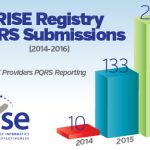The Rheumatology Informatics System for Effectiveness (RISE) 2019 MIPS submission tool will open in mid-January. RISE staff are in the process of completing final data refreshes and reviews to ensure data accuracy. The ACR will notify all practices as soon as the submission tool is open. Practices are requested to complete their submission by March…

The Look Back: ACR President Dr. Paula Marchetta Recaps 2019
We all have a short list of famous individuals whose writings inspire us and guide us. At the start of my presidential year, I turned to my own short list for some words of wisdom from Peter Drucker, whom many consider to be the founder of modern management theory. Underpinning Drucker’s teachings is a strong…

The RISE Registry: A Powerful Collaboration Tool for Clinicians & Researchers
Practice-based evidence, like that in the RISE registry, can be used to describe trends in patient care, look at comparative effectiveness of interventions and much more.
RISE Up & Learn: Opportunities to Learn More
The Rheumatology Informatics System for Effectiveness (RISE) registry is a constantly evolving resource, and many valuable offerings are being made available at the 2018 ACR/ARHP Annual Meeting in Chicago. Here’s a list of things you won’t want to miss: RISE Booth in the Discovery Center Join RISE at the ACR Discovery Center inside the exhibit…
RISE Continues to Improve Offerings for Providers
ACR members are realizing what they have at their fingertips—a registry fully staffed with knowledgeable people ready to help them succeed under MIPS. This valuable resource allows members to do what they do best: Treat patients with rheumatoid arthritis (RA), which is one of the primary goals of the Rheumatology Informatics System for Effectiveness (RISE)…

Avoid Errors: Insights into Ensuring Accurate Data in EHRs
With the increasing use of electronic health records and quality measure reporting requirements, data collection has become crucial for rheumatologists. But how do clinicians prevent human error and ensure data accuracy?
ACR in Action: A Look at ACR Activities That Support Your Practice
Rheumatologists working in every practice setting face a number of challenges that can seem insurmountable. How do you cost-effectively manage administrative burdens? How do you establish an efficient and effective approach to capturing quality metrics? How do you maintain the critical elements of the care you provide, such as diagnostic musculoskeletal ultrasound and patient access…

RISE Registry Report
The Rheumatology Informatics System for Effectiveness (RISE) Registry is the ACR’s registry for quality improvement and reporting. Aggregated statistics and trends seen in the RISE Registry will be published monthly in The Rheumatologist. Visit www.RISEregistry.org to learn how you can use RISE to improve your patient care. As a Qualified Clinical Data Registry, RISE provides an…
Maximizing the ACR’s Power: A conversation with Rheumatology Research Foundation President Eric Matteson, MD, MPH
In preparing for the second year of his term leading the Rheumatology Research Foundation, Eric Matteson, MD, MPH, has developed an ambitious set of goals for the year ahead, and he says the strong professional and personal inspiration he gets from serving in various volunteer roles within the College is what helps drive him to…
The ACR Advocates for More MIPS Points for RISE Use
On behalf of the rheumatology community, the ACR recently submitted an entry for a rheumatology-specific Clinical Practice Improvement Activity (CPIA) that, if accepted, will be included in the 2018 performance year. The CMS put a call out to the public for CPIAs in an attempt to make MACRA more meaningful for participating providers. The ACR…